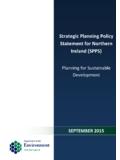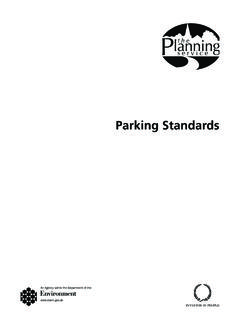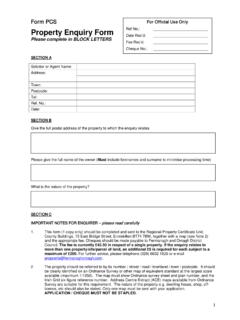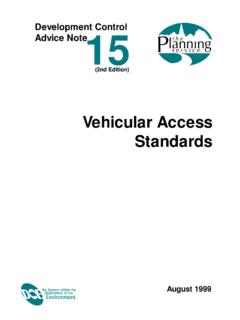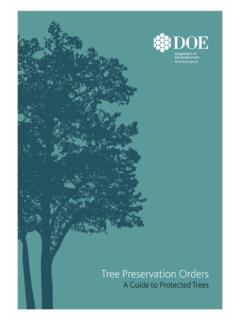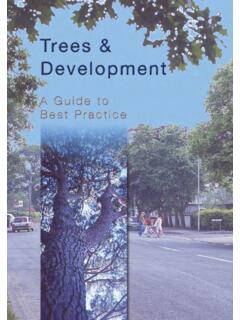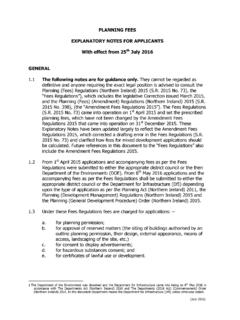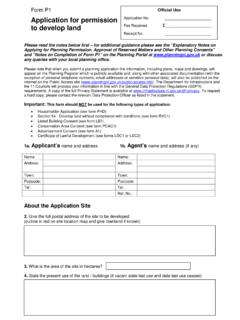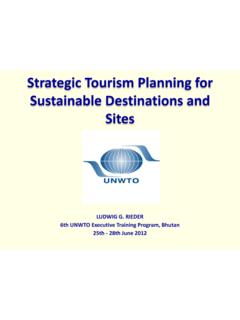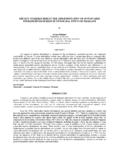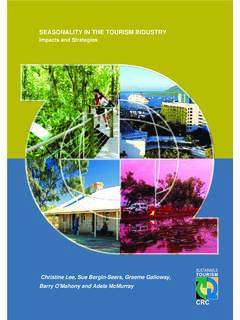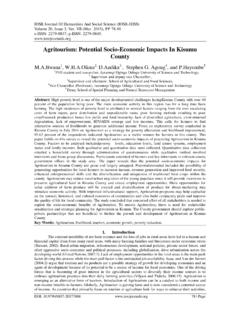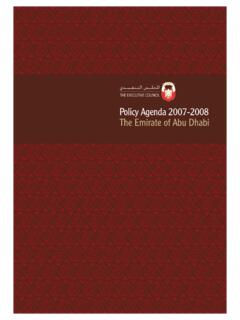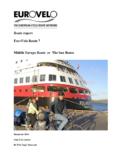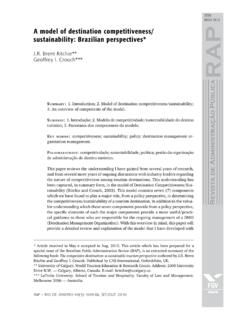Transcription of Planning and Environmental Policy Group - Planning Service
1 Planning and Environmental Policy Group Planning Policy Statement 16. Tourism June 2013. Planning Policy Statement 16: Tourism Planning Policy Statements (PPSs) set out the policies of the Department of the Environment on particular aspects of land use Planning and apply to the whole of Northern Ireland. Their contents will be taken into account in preparing development plans and are also material to decisions on individual Planning applications and appeals. This Planning Policy Statement, PPS 16 Tourism' sets out the Department's Planning Policy for tourism development, including the main forms of tourist accommodation and tourist amenities. In addition the PPS provides Policy for the safeguarding of tourism assets from development likely to adversely impact upon the tourism value of the Environmental asset.
2 Planning Policy Division Department of the Environment Millennium House 17-25 Great Victoria Street BELFAST, BT2 7BN. June 2013. CONTENTS. Preamble .. 1. Introduction .. 2. Policy Context .. 4. Policy Objectives .. 7. The Role of Development Plans .. 8. Existing Policy Provision for Tourism Development in the Countryside .. 10. Consultation .. 13. Planning Policies .. 14. APPENDIX 1 GLOSSARY OF TERMS .. 34. APPENDIX 2 INFORMATION REQUIREMENTS .. 37. APPENDIX 3 TOURIST AMENITIES IN THE 38. APPENDIX 4 - LANDSCAPE DESIGN CONSIDERATIONS FOR. HOLIDAY PARKS .. 40. Preamble The Department has a statutory duty, laid down in Article 3 of the Planning (Northern Ireland) Order 1991, to formulate and co-ordinate Policy for securing the orderly and consistent development of land and for the Planning of that development.
3 The Department is required to ensure such Policy is in general conformity with the Regional Development Strategy. The Department's Planning policies are normally issued through Planning Policy Statements (PPS) and PPS 1 General Principles' advises that: Planning Policy Statements set out the policies of the Department on particular aspects of land-use Planning and apply to the whole of Northern Ireland. Their contents will be taken into account in preparing development plans and are also material to decisions on individual Planning applications and appeals.. This Planning Policy Statement, PPS 16 Tourism' sets out the Department's Planning Policy for tourism development and also for the safeguarding of tourism assets.
4 It seeks to facilitate economic growth and social well-being through tourism in ways which are sustainable and compatible with Environmental welfare and the conservation of important Environmental assets. It embodies the Government's commitment to sustainable development and to the conservation of biodiversity. When issued in final form, the policies of this Statement will supersede Tourism Policies SP10 and TOU 1 to TOU 4 of the Planning Strategy for Rural Northern Ireland (PSRNI) and also Policy CTY 1 of PPS 21 as it relates to the tourism policies of PSRNI. Policies in PPS 21 offering scope for tourism development in the countryside are not duplicated in PPS 16 and will be applied as appropriate to individual proposals.
5 The policies of this Statement will also supersede Coastal Policies CO 5, CO 6 and CO 7 of PSRNI and also those elements of the remaining coastal policies insofar as they relate to tourism development or the protection of tourism assets from inappropriate development. Where the above policies are referred to elsewhere in PSRNI, the policies of this statement will take precedence. The PPS has been subjected to an equality impact screening exercise in line with the statutory obligation contained in Section 75 of the Northern Ireland Act 1998. The outcome of this exercise indicates that the PPS is unlikely to have significant adverse implications for equality of opportunity or community relations. Nothing in this document should be read as a commitment that public resources will be provided for any specific project.
6 All proposals for expenditure by the Department are subject to economic appraisal and will also have to be considered having regard to the overall availability of resources. 1. Introduction Tourism is defined by the World Tourism Organisation (WTO) as comprising the activities of persons travelling to and staying in places outside their usual environment for not more than one consecutive year for leisure, business and other purposes. The WTO further explains that Tourism refers to all activities of visitors including both tourists (overnight visitors) and same-day visitors . This definition has been adopted by the UK Government and the WTO. definition of tourism is therefore used for the purpose of the PPS. Tourism encompasses a very wide range of activities.
7 It can include travel and visits for business, professional and domestic purposes as well as for holidays and recreation. Often, more than one purpose may be involved. The duration of tourist trips is also highly variable as it can include the annual family holiday as well as a wide range of shorter visits, weekend breaks and day trips. Tourism is therefore an extremely diverse form of activity which is subject to changing trends in the types, distribution and duration of tourist activity. Tourism makes an important contribution to the Northern Ireland economy in terms of the revenues it generates, the employment opportunities it provides, and the potential it creates for economic growth. In 2011 Northern Ireland tourism and leisure supported 54 000 jobs (8% of total jobs).
8 During 2011 an estimated million overseas visitors stayed at least 1 night in Northern Ireland, spending an estimated 368 million. Tourism spending helps to support a wide range of economic activities. As well as direct spending on holiday accommodation and use of tourist amenities, tourism plays an important role in helping to support the viability of many local suppliers, services and facilities. It improves assets and provides infrastructure for local people and tourists, supports the vibrancy of Northern Ireland's culture and heritage, and sustains communities. Through utilising existing Environmental , historical, cultural and geographic assets, tourism can be a key economic driver capable of stimulating further growth and development opportunities.
9 This has been recognised by government through investment in various Tourism Signature Projects throughout Northern Ireland. Tourism can also benefit the assets on which it depends for example through assisting in the financing of conservation or enhancement initiatives. In towns and cities tourism can contribute positively to urban regeneration. In rural areas tourism is important to the development of the rural economy and offers, for example, opportunities for farm diversification to supplement farm incomes or for broader rural diversification capable of providing employment. Tourism also has the potential to contribute to meeting broader government commitments aimed at relieving poverty and enhancing social inclusion and cohesion in areas subject to problems of this type.
10 The WTO promotes sustainable tourism and defines this as: tourism that meets the needs of present tourists and host regions while protecting and enhancing opportunity for the future . It goes on to state that: the objective of 2. sustainable tourism is to retain the economic and social advantages of tourism development while reducing or mitigating any undesirable impacts on the natural, historic, cultural or social environment.. Sustainable tourism development is brought about by balancing the needs of tourists and the tourism industry with those of the destination. This requires management and the land use Planning system has a key role in managing tourism-related development through Planning policies that provide a framework for identifying appropriate development opportunities and safeguarding tourism assets from harmful development.
